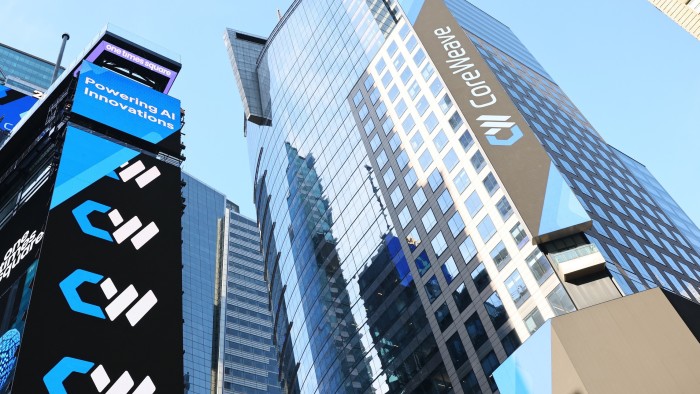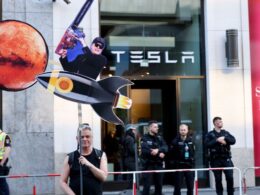Unlock the Editor’s Digest for free
Roula Khalaf, Editor of the FT, selects her favourite stories in this weekly newsletter.
CoreWeave borrowed $2bn through the US junk bond market on Wednesday, injecting fresh capital into the artificial intelligence data centre operator after its volatile Wall Street debut in March.
Lenders shrugged off concerns about CoreWeave’s outlook and economic fallout from the global tariff war, with strong investor orders allowing its bankers to increase the size of the offering and secure it at better terms than initially expected, people briefed on the matter said.
Executives characterised investor demand for its debt as “robust”, which prompted CoreWeave to raise $500mn more than planned. The new bonds mature in 2030 and will carry an interest rate of 9.25 per cent.
The outcome marks a welcome reprieve for CoreWeave after it was forced to cut the size of its March initial public offering. The shares surged 16 per cent on Wednesday and are now up more than 160 per cent from the listing.
It underscores the big demand among investors for high-yield debt given a drop-off in new debt issuance in the aftermath of US President Donald Trump’s “liberation day” trade tariffs announcement.
In a sign of that strong appetite, CoreWeave was able to structure the new debt as unsecured bonds, which do not carry the same seniority as its existing secured debt.
“Equity and credit markets seem to think the worst is behind us, even as a lot of tariff details still need to be ironed out,” said Dec Mullarkey, managing director at fund group SLC Management. “The signals from the White House that it is willing to be flexible and deal-motivated have definitely lifted the risk mood.”
CoreWeave lends computing power to technology companies that are building AI models. After launching as a cryptocurrency miner in 2017, it pivoted two years later and has grown rapidly in conjunction with the broader AI boom in recent years.
CoreWeave had hoped to raise $2.7bn in its IPO, but lacklustre demand at the time weighed on the deal and it raised just $1.5bn.
Investors had expressed concern about weaker demand for AI infrastructure as well as the company’ sizeable debt burden. CoreWeave’s foray into the junk bond market will allow it to refinance part of its overall debt load at lower rates. It has separately disclosed that it is looking to secure as much as $2.6bn through new loans.
The debt sale comes amid a pick-up in debt issuance, as markets rebound from April’s volatility.
CoreWeave remained reliant on relationships with Nvidia and Microsoft, S&P Global analysts said in a note explaining their assignment of a B-plus credit rating. Single B-ratings are deep in junk territory, indicating the higher risks investors face if they invest in the bonds.
“The company’s significant supplier concentration with Nvidia and customer concentration with Microsoft are beneficial today but could pose a risk in three to five years,” S&P analysts wrote.
CoreWeave did not respond to a request for comment.
Source link









